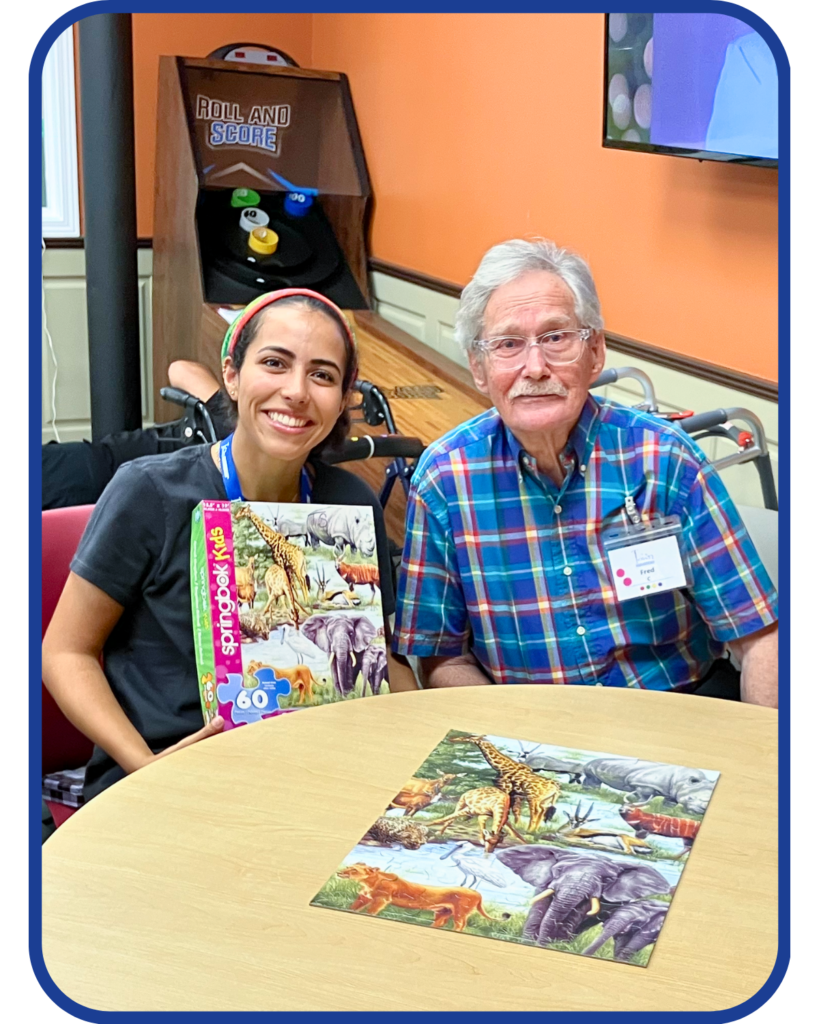Hearing Loss, Isolation, and Dementia: Why Staying Social is Essential for Seniors
How Hearing Loss Affects Seniors and the Power of Community
Did you know that untreated hearing loss can double, triple, or even quintuple a senior’s risk of developing dementia? More than just an inconvenience, hearing loss affects brain health, memory, and emotional well-being. Yet many seniors withdraw from social interactions when they struggle to hear, leading to isolation, depression, and faster cognitive decline.
The good news? Social engagement is one of the best ways to keep the brain active and healthy, even for those with hearing difficulties. Town Square NW Austin provides a welcoming, structured environment where seniors can connect, engage in stimulating activities, and thrive—regardless of their hearing ability.
The Hidden Risks of Hearing Loss 
Hearing loss doesn’t just mean struggling to follow conversations—it has broader health and cognitive implications. Research from Johns Hopkins University shows that older adults with hearing loss are at significantly higher risk for developing dementia (source). In fact, studies indicate that hearing loss may account for up to 8% of dementia cases worldwide. But why?
Brain Strain: The Cognitive Load of Hearing Loss
When hearing declines, the brain has to work harder to process and interpret sounds. This extra effort can take a toll, redirecting cognitive resources away from memory and problem-solving functions—a concept known as cognitive overload. Over time, this added strain may accelerate brain shrinkage and cognitive decline.
The Isolation Factor: Social Withdrawal and Mental Decline
Another major risk is social isolation. When seniors find conversations difficult, they often withdraw to avoid embarrassment or frustration. But this lack of social interaction can have serious consequences—loneliness, depression, and cognitive decline, all of which are known risk factors for dementia. (source).
How Staying Engaged Can Slow Cognitive Decline
The research is clear: Social engagement helps preserve brain function. A study published in The Lancet found that hearing aids could reduce dementia risk by nearly 50% in high-risk individuals (source). But beyond hearing aids, daily interactions, meaningful conversations, and structured activities are essential for keeping seniors’ minds active.
How Town Square NW Austin Helps Seniors with Hearing Loss Stay Engaged
Hearing loss doesn’t have to mean isolation. With the right environment, seniors can continue to stay socially connected and engaged. At Town Square NW Austin, we create a space where hearing loss doesn’t hold anyone back from meaningful interactions. Here’s how we help:
Smaller Group Settings: Activities are designed to encourage one-on-one or small group engagement, making conversations easier to follow.
Multi-Sensory Activities: Seniors can engage in activities that don’t rely solely on verbal communication, like music therapy, art, and movement-based programs.
Trained Staff Who Understand Hearing Loss: Our caregivers and program facilitators are trained to speak clearly, face seniors directly when communicating, and incorporate visual cues to enhance conversations.
Reminiscence Therapy: Town Square’s nostalgic 1950s setting helps spark long-term memories, reducing frustration from communication barriers and fostering meaningful engagement.
Social Interaction in a Comfortable Space: Even for seniors who struggle with hearing, simply being in a vibrant, active environment can reduce feelings of loneliness and promote mental well-being.
 Practical Tips for Caregivers Supporting a Senior with Hearing Loss
Practical Tips for Caregivers Supporting a Senior with Hearing Loss
If your loved one is struggling with hearing loss, here are some ways to help them stay engaged:
Encourage the Use of Hearing Aids: Many seniors resist hearing aids due to stigma or discomfort. Share research on how hearing aids can improve their cognitive health and help them stay socially connected.
Use Visual Cues and Body Language: Face your loved one directly when speaking, use gestures to reinforce meaning, and speak at a moderate pace.
Incorporate Music Therapy: Music is a powerful tool for engagement. Studies show that even seniors with advanced dementia respond positively to familiar songs.
Introduce a Social Environment Like Town Square NW Austin: Encourage your loved one to spend time in a structured, social setting where they can engage in meaningful activities without the stress of following complex conversations.
Try Hearing-Assistive Apps: Apps like Ava, Sound Amplifier, and Otter.ai can provide real-time captions or amplify speech, making conversations easier to follow.
Staying Social, Staying Sharp
Hearing loss doesn’t have to lead to isolation and cognitive decline. By encouraging social engagement and providing opportunities for meaningful interaction, you can help your loved one stay mentally sharp and emotionally fulfilled.
At Town Square NW Austin, we provide a warm, inclusive environment where seniors can connect, engage, and thrive—no matter their hearing ability. If you’d like to learn more about how our programs can benefit your loved one, schedule a free tour today.
Call 512-375-4328 or visit Town Square NW Austin to learn more and schedule a free tour today!


